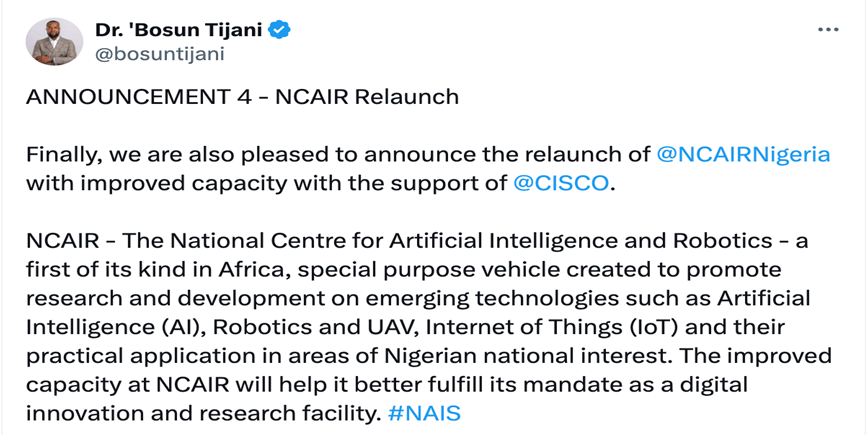|
Getting your Trinity Audio player ready...
|
The Nigerian government has launched the country’s first multilingual large language model (LLM) that will reflect its diversity and play a major role in its national artificial intelligence (AI) strategy.
Communications, Innovation and Digital Economy Minister Bosun Tijani announced the new LLM at the National Artificial Intelligence Strategy Workshop.
The new LLM will be trained in five “low-resource local languages and accented English to ensure stronger language representation in existing datasets for the development of artificial intelligence solutions.”
ANNOUNCEMENT 3 – Nigerian Multilingual Large Language Model
The launch of Nigeria’s first Multilingual Large Language Model (LLM) through a partnership between @awarritech, @DataDotOrg, @NITDANigeria and @NCAIRNigeria.
The LLM will be trained on 5 low resource languages and… pic.twitter.com/97THQGnPmc
— Dr. 'Bosun Tijani (@bosuntijani) April 19, 2024
The language model is the product of a partnership between the government and the private sector. Awarritech, a local AI firm, and Data.org, a global data democratization initiative by Mastercard (NASDAQ: MA) and the Rockefeller Foundation, represent the private sector. The National Information Technology Development Agency (NITDA) and National Centre for Artificial Intelligence and Robotics (NCAIR) represented Nigeria’s government in the development of LLM.
Additionally, the government relied on over 7,000 fellows from its 3MTT Nigeria program, which targets 3 million graduates who are fully proficient in technical courses, from AI and cybersecurity to cloud computing and machine learning.
One of the greatest challenges facing AI is bias. While policies can help reshape AI to be more inclusive, diversity in AI input will have a greater impact. One key solution is to develop localized LLMs that incorporate language and cultural nuances, resulting in AI that promotes connections globally.
In addition to the new LLM, Tijani announced the launch of the Nigeria AI Collective, a community of industry players pushing for AI development.
“We are inviting AI researchers, practitioners, academia, government, civil society organisations, startups, entrepreneurs, students and AI enthusiasts in general to join the collective to harness the power of artificial intelligence,” the minister said.
Tijani further relaunched the NCAIR, a subsidiary of NITDA focused on developing the two sectors.

Arthur Brown, the deputy chief of mission at the U.S. Embassy in Abuja, pledged the Biden government’s support to Nigeria’s AI initiatives. He announced that within the next two weeks, the U.S. will conduct an event in Lagos to foster collaboration between the two countries.
In order for artificial intelligence (AI) to work right within the law and thrive in the face of growing challenges, it needs to integrate an enterprise blockchain system that ensures data input quality and ownership—allowing it to keep data safe while also guaranteeing the immutability of data. Check out CoinGeek’s coverage on this emerging tech to learn more why Enterprise blockchain will be the backbone of AI.
Watch: The future has already arrived in Nigeria

 02-20-2026
02-20-2026 




